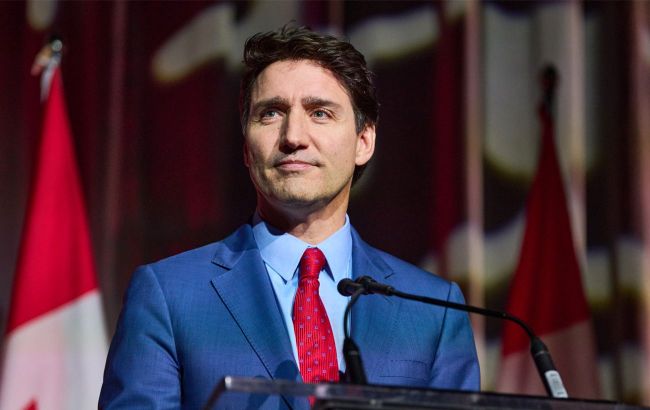Change of power in Canada: Who will succeed Trudeau and what it means for Ukraine
 Photo: Canadian Prime Minister Justin Trudeau (Getty Images)
Photo: Canadian Prime Minister Justin Trudeau (Getty Images)
After nine years in power, Canadian Prime Minister Justin Trudeau has resigned. Another G7 country will now experience political turbulence.
RBC-Ukraine explains why Trudeau is stepping down, how events will unfold, who may become his successor, and what this means for Ukraine.
Contents
- Why is Justin Trudeau resigning
- Who will be the new head of the government
- What does this mean for Ukraine
On Monday morning, Canadian time, Justin Trudeau announced his upcoming resignation as Prime Minister and leader of the Liberal Party. However, this will not happen immediately — Trudeau will continue to lead Canada for some time until the party chooses his successor.
Why is Justin Trudeau resigning
The political crisis in Canada has intensified following Donald Trump's victory in the US presidential elections. The newly elected US president has repeatedly made claims about Canada regarding migration, alleging that a continuous flow of illegal immigrants and drugs is entering the US through the northern border.
Additionally, Trump plans to impose trade tariffs on Canada to encourage American manufacturers to bring their businesses back to the US. Since 1994, the US, Canada, and Mexico have had a free trade zone (NAFTA), which made it beneficial for American companies to move production facilities abroad.
During his first term, Trump already succeeded in renegotiating NAFTA to more favorable terms for the US. However, the new agreement, called USMCA, no longer meets his satisfaction, and this time, Trump's plans involve even more radical steps. He intends to impose an additional 25% import tariff on goods produced in Canada, which would severely harm the Canadian economy.
.jpg)
Photo: The political crisis in Canada escalated after Donald Trump's victory in the US elections (Getty Images)
Justin Trudeau privately visited Donald Trump's residence in Florida to personally discuss grievances regarding his country. According to individuals who were present at the meeting, Trump openly mocked Trudeau, jokingly suggesting he could become the "Governor of the state of Canada" once the US annexes Canada.
This situation further fueled internal contradictions within Canada's ruling party. In December of the previous year, Chrystia Freeland resigned from her position as Finance Minister. The reason for her resignation was differing views on how to respond to Trump's threats. Freeland advocated for a tougher stance against potential US actions and suggested that Canada should "tighten its belts" to mitigate the impact of Trump's economic measures. Trudeau, on the other hand, favored a softer approach for Canada.
These two approaches had already caused disputes between Trudeau and Freeland in the past. However, with the external threat intensifying, the two politicians have now reached a definitive breaking point. Adding to this are the economic challenges facing the country, along with the housing and migration crises.
Who will be the new head of the government
Canada was expected to hold parliamentary elections by October this year. Until then, the power would formally remain in the hands of the Liberal Party.
Trudeau had the option to step down immediately without waiting for the election of a new party leader (who would automatically become the next prime minister). According to The Globe and Mail Canadian news agency, citing its sources, current Finance Minister Dominic LeBlanc could become the interim prime minister and party leader. However, Trudeau has decided to remain in office for the transitional period.
The political situation in Canada is further complicated by the fact that the Liberals do not hold a majority in Parliament. For the past few years, Canada has had a minority government, and other parties have been engaged situationally to pass key decisions.
Therefore, early elections are now very likely. Both the opposition Conservative Party and the New Democratic Party are calling for them.
If early elections are held, most likely in the spring, the Liberals have little chance of retaining power.
The gap between the Liberal Party and its main competitors, the Conservative Party, is already catastrophic. According to the polling aggregator Poll Tracker, the Conservatives have a 44% rating, while the Liberals stand at 20.9%. In third place is the New Democratic Party, also in opposition, with 19%.
What does this mean for Ukraine
Chrystia Freeland, as a potential prime minister of Canada, would be a good choice for Ukraine. She comes from a family of Ukrainian immigrants and has long and consistently advocated for stronger support for Ukraine.
The arrival of the Conservatives could also bring positive changes for Ukraine. This opposition party similarly supports Ukraine — perhaps even more so than the Liberals.
In February of last year, Conservative leader Pierre Poilievre sharply criticized Trudeau's government's indecisiveness. He argued that the government had failed to increase the production of 155 mm ammunition and had still not delivered the promised NASAMS air defense systems to Ukraine, which had been pledged since the previous year.
However, Poilievre has raised objections regarding the free trade agreement between Ukraine and Canada. Therefore, it is possible that with the Conservatives coming to power, Canada's position may become more pragmatic. And it cannot be ruled out that Poilievre, who is called the ‘Canadian Trump’, will actively focus on the position of the future owner of the White House in his policy.
Sources: statements by Justin Trudeau from January 6, and materials from The Globe and Mail, Reuters, and ABC News.

